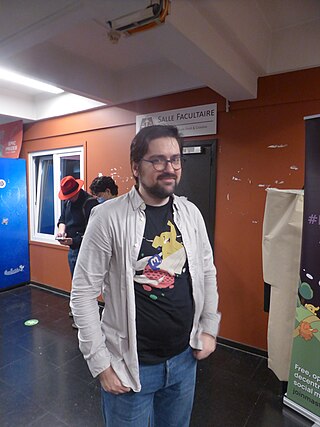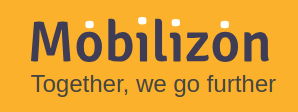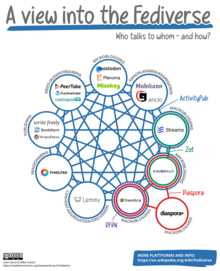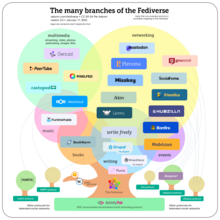Microblogging is a form of blogging using short posts without titles known as microposts. Microblogs "allow users to exchange small elements of content such as short sentences, individual images, or video links", which may be the major reason for their popularity. Some popular social networks such as Twitter, Threads, Mastodon, Tumblr, Koo, and Instagram can be viewed as collections of microblogs.

GNU social is a free and open source microblogging server written in PHP that implemented the OStatus and ActivityPub standard for interoperability between installations. While offering functionality similar to Twitter, GNU social seeks to provide the potential for open and distributed communications between microblogging communities. Enterprises and individuals can install and control their own services and data.
OpenMicroBlogging is a deprecated protocol that allows different microblogging services to inter-operate. It lets the user of one service subscribe to notices by a user of another service. This enables a federation of new communities, as potentially an organization of any size can host a service. OpenMicroBlogging utilizes the OAuth and Yadis protocols and does not depend on any central authority.
A distributed social network or federated social network is an Internet social networking service that is decentralized and distributed across distinct service providers, such as the Fediverse or the IndieWeb. It consists of multiple social websites, where users of each site communicate with users of any of the involved sites. From a societal perspective, one may compare this concept to that of social media being a public utility.
Flipboard is a news aggregator and social network aggregation company based in Palo Alto, California, with offices in New York, Vancouver, and Beijing. Its software, also known as Flipboard, was first released in July 2010. It aggregates content from social media, news feeds, photo sharing sites, and other websites, presents it in magazine format, and allows users to "flip" through the articles, images, and videos being shared. Readers can also save stories into Flipboard magazines. As of March 2016 the company claims there have been 28 million magazines created by users on Flipboard. The service can be accessed via web browser, or by a Flipboard application for Microsoft Windows and macOS, and via mobile apps for iOS and Android. The client software is available at no charge and is localized in 21 languages.

OStatus is an open standard for federated microblogging, allowing users on one website to send and receive status updates with users on another website. The standard describes how a suite of open protocols, including Atom, Activity Streams, WebSub, Salmon, and WebFinger, can be used together, which enables different microblogging server implementations to route status updates between their users back-and-forth, in near real-time.

Friendica is a free and open-source software distributed social network. It forms one part of the Fediverse, an interconnected and decentralized network of independently operated servers.
Distributed social network projects generally develop software, protocols, or both.

pump.io is a general-purpose activity streams engine that can be used as a federated social networking protocol which "does most of what people really want from a social network". Started by Evan Prodromou, it is a follow-up to GNU social, and is designed to be more lightweight and usable for general data instead of just microblogging. The largest StatusNet instance at the time, Identi.ca, which was the largest StatusNet service and ran by Prodromou, switched to pump.io in June 2013.

PeerTube is a free and open-source, decentralized, ActivityPub federated video platform powered by WebTorrent, that uses peer-to-peer technology to reduce load on individual servers when viewing videos.

Mastodon is free and open-source software for running self-hosted social networking services. It has microblogging features similar to Twitter, which are offered by a large number of independently run nodes, known as instances or servers, each with its own code of conduct, terms of service, privacy policy, privacy options, and content moderation policies.
Micro.blog is a microblogging and social networking service created by Manton Reece. It is the first large multi-user social media service to support the Webmention and Micropub standards published by the World Wide Web Consortium, and is part of the Fediverse, supporting ActivityPub.

ActivityPub is an open, decentralized social networking protocol based on Pump.io's ActivityPump protocol. It provides a client/server API for creating, updating, and deleting content, as well as a federated server-to-server API for delivering notifications and content.

Pixelfed is a free and open-source image sharing social network service. The platform distinguishes itself from other image sharing services through its decentralized architecture, meaning user data is not stored on a central server. It uses the ActivityPub protocol, allowing users to interact with other social networks within the protocol, such as Mastodon, PeerTube, and Friendica. Pixelfed and other platforms utilizing this protocol are considered to be part of the Fediverse. The network is made up of several independent sites that communicate with one another, which is roughly comparable to e-mail providers. The parties involved do not all have to be registered with the same provider, but can still communicate with each other. Thus, users are able to sign up on any server and follow others on the other instances.

Bluesky, also known as Bluesky Social, is a decentralized microblogging social platform and a public benefit corporation based in the United States. Jay Graber serves as the company's CEO and XMPP creator Jeremie Miller sit on its board of directors.

Eugen Rochko is a Russian-born German software developer, best known as the creator of Mastodon, a decentralized open-source social networking platform consisting of a large number of independently run nodes, known as instances, each with its own code of conduct, terms of service, privacy policy, privacy options, and moderation policies.

Lemmy is a free and open-source software for running self-hosted social news aggregation and discussion forums. These hosts, known as "instances", communicate with each other using the ActivityPub protocol.

Mobilizon is an open source software for event planning and group management, launched in October 2020 by Framasoft to offer a free alternative to the platforms of GAFAM. Mobilizon gained much visibility in hacker circles relatively fast, but also soon within cultural scene in Europe and more recently in the mainstream IT media.

Nostr is a decentralized network protocol for a distributed social networking system. The name is an acronym for "Notes and Other Stuff Transmitted by Relays". It was designed with goals of censorship-resistance in mind.

Misskey is self-hosted social networking software. It is commonly used as part of the Fediverse network, with Mastodon and similar software.














